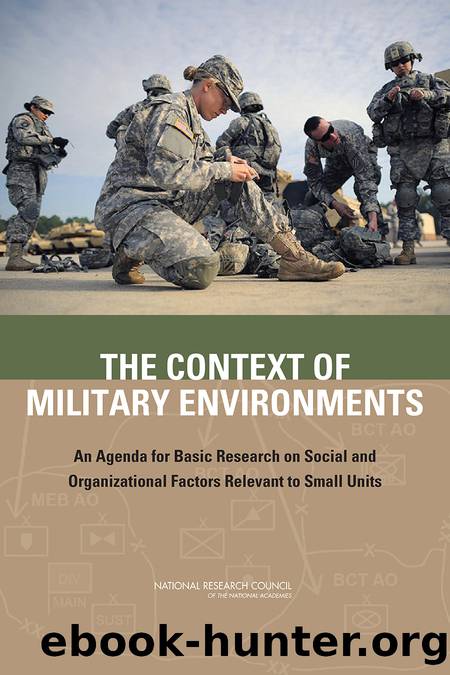The Context of Military Environments: An Agenda for Basic Research on Social and Organizational Factors Relevant to Small Units by Committee on the Context of Military Environments: Social & Organization Factors

Author:Committee on the Context of Military Environments: Social & Organization Factors
Language: eng
Format: epub
Tags: ebook, book
Publisher: The National Academies Press
Published: 2014-09-12T00:00:00+00:00
5
Distinct Sources of Power and Status in Diversified Army Units
Military organizations are distinctive in the visibility and rigidity of their formal power hierarchies and chain of command. Military ranks define an explicit, consistent, complete ordering of formal authority and power. Furthermore, the paths of promotion to higher levels of power in the Army are well defined; there are few detours to promotion outside the standard routes and no âexternal hires.â But, as in every organization, there are also important informal and less explicit sources of respect, esteem, and social influence that determine an individualâs placement on the status hierarchy, a hierarchy distinct but interrelated to the power hierarchy. In this chapter, the committee proposes research to understand soldiersâ access to positions of social influence and authority not only in the formal, rank-based power hierarchy but also through informal, respect-based sources of status in the Army. The proposed research addresses questions such as the following:
To the extent that soldiers derive status from their similarity to ideal or typical soldiers, where do valued identities originate and how do these socially shared beliefs change?
How do changes in the skills that are required in military operations impact how soldiers achieve status?
How does the attainment of status influence career development, particularly for individuals who do not match the stereotype of the prototypical soldier (for example, individuals who are minorities in terms of gender, race, or sexual orientation or who represent a smaller and different job skill than the majority within the unit they serve)?
What are the implications for leadership and authority for soldiers from traditionally disadvantaged groups, whose informal status may not align with their formal power?
Download
This site does not store any files on its server. We only index and link to content provided by other sites. Please contact the content providers to delete copyright contents if any and email us, we'll remove relevant links or contents immediately.
AI Native Enterprise: The Leader's Guide to AI-Powered Business Transformation by Yi Zhou(303)
Challengers: How a New Breed of Leaders Collaborates and Wins in a Hyper Competitive World by Ben-Attar Saar(300)
Time is Now: A Journey Into Demystifying AI by Raj Verma(267)
Stoic at Work by Annie Lawson(248)
Change Management that Sticks by Barb Grant(233)
Impact with Love: Building Business for a Better World by Greg Harmeyer(215)
Leadership Team Alignment by Frédéric Godart(208)
Startups Grow With People by Dagdeviren Ozan(187)
Reconstructing Inclusion by Amri B. Johnson(185)
People and Data by Redman Thomas C.;(183)
Corporate Fraud Exposed by Baker H. Kent;Purda Lynnette;Saadi Samir;(181)
9 Powerful Practices of Really Great Teams by Stephen E. Kohn(180)
Leading and Managing Change in the Age of Disruption and Artificial Intelligence by Donald Mathew;(179)
You're Too Smart for This : (Beating the 100 Big Lies About Your First Job) by Michael Ball(177)
Change Your Business with NLP by Lindsey Agness(171)
The New Alpha: Join the Rising Movement of Influencers and Changemakers Who Are Redefining Leadership by Danielle Harlan(168)
How to Speak Human by Jackson Dougal;Jackson Jennifer;(167)
Leadership Transitions by Richard Elsner(163)
The Executive Warrior by Ng Victor;(161)
